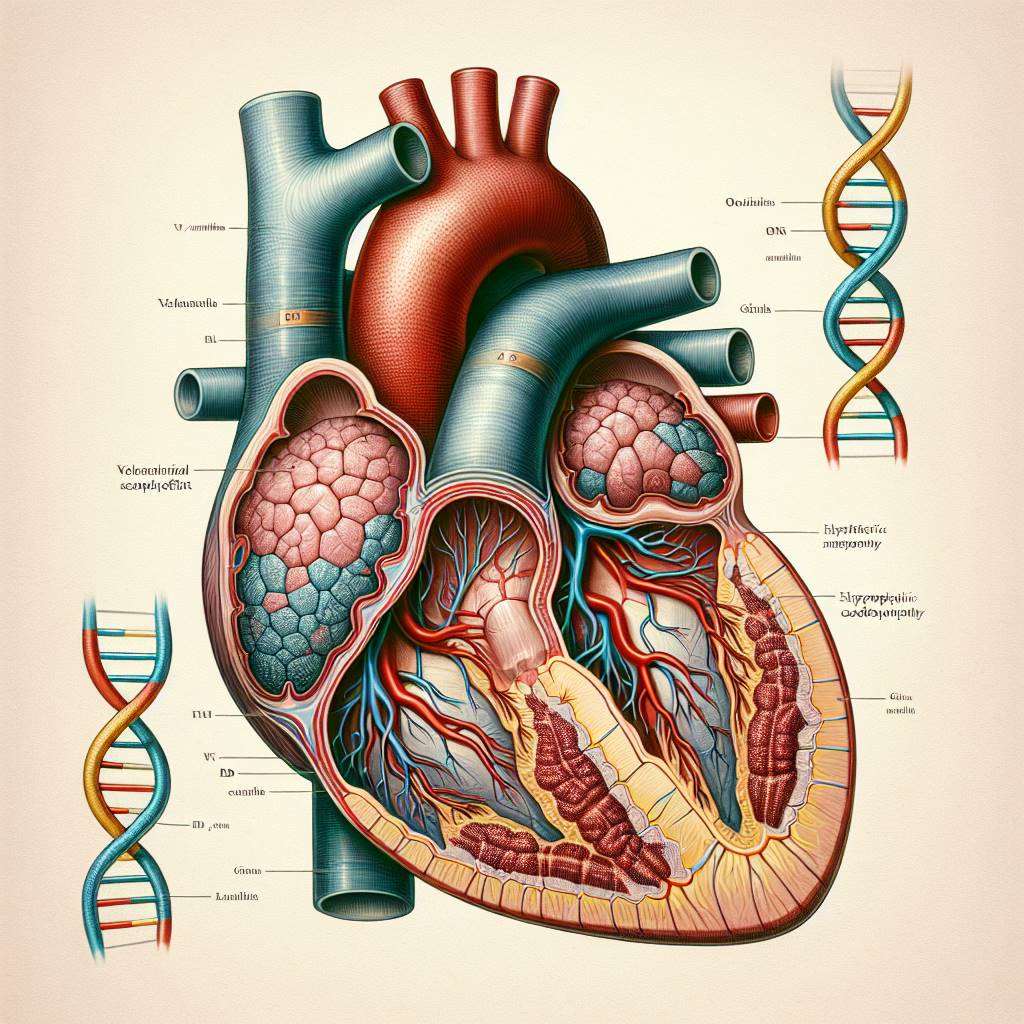Genetic heart conditions are inherited disorders that can affect the structure or function of the heart, often leading to serious complications. These conditions, such as hypertrophic cardiomyopathy or long QT syndrome, may go unnoticed until symptoms appear. Recognizing the role of family history in these conditions is crucial for early diagnosis and management.
Medical disclaimer: This content is for general awareness and does not replace a doctor’s consultation. For diagnosis or treatment decisions, consult a qualified specialist.
Advanced treatments like Automatic Implantable Cardioverter Defibrillators (AICDs) can help prevent life-threatening events in individuals at high risk. Understanding the connection between genetics and heart health empowers families to take proactive steps, including genetic testing and preventive care. Raising awareness about these conditions can save lives and improve quality of life.
Understanding Genetic Heart Conditions: What You Need to Know
Genetic heart conditions are caused by mutations in specific genes that affect the heart's structure or electrical system. These conditions can lead to arrhythmias, heart failure, or sudden cardiac arrest. Common examples include hypertrophic cardiomyopathy, dilated cardiomyopathy, and Brugada syndrome.
These disorders often run in families, making it essential to understand your genetic predisposition. Symptoms may vary widely, from mild fatigue to severe chest pain or fainting. In some cases, individuals remain asymptomatic, which underscores the importance of regular check-ups and early screening for those with a family history of heart disease.
Treatment options depend on the specific condition but may include medications, lifestyle changes, or devices like AICDs. Early diagnosis and intervention can significantly improve outcomes for patients with genetic heart conditions.

How Family History Impacts Your Heart Health Risks
Family history plays a critical role in determining your risk for genetic heart conditions. If a close relative has been diagnosed with a heart disorder or experienced sudden cardiac arrest, your chances of inheriting a similar condition increase. This is particularly true for conditions like long QT syndrome or arrhythmogenic right ventricular cardiomyopathy.
Genetic mutations can be passed down through generations, even if symptoms are not apparent in every family member. This makes it vital to share your family’s medical history with your healthcare provider. They can assess your risk and recommend appropriate screening or preventive measures.
Preventive strategies may include lifestyle modifications, regular monitoring, or advanced interventions like genetic testing. By understanding your family history, you can take proactive steps to protect your heart health and that of future generations.
What Is an AICD and How Does It Work?
An Automatic Implantable Cardioverter Defibrillator (AICD) is a life-saving device designed to monitor and regulate abnormal heart rhythms. It is particularly beneficial for individuals at high risk of sudden cardiac arrest due to genetic heart conditions like Brugada syndrome or hypertrophic cardiomyopathy.
The AICD is implanted under the skin, usually near the chest, and connected to the heart via thin wires. It continuously monitors the heart's electrical activity and delivers a shock if it detects a dangerous arrhythmia, restoring a normal rhythm. This intervention can prevent fatal outcomes in high-risk patients.
While the device is highly effective, it is not without risks. Potential complications include infection, device malfunction, or inappropriate shocks. However, for many patients, the benefits of an AICD far outweigh the risks, offering peace of mind and improved survival rates.
Signs Your Family History May Indicate Heart Risks
Certain warning signs in your family history may suggest an increased risk of genetic heart conditions. These include:
- Sudden cardiac death in a relative under 50 years of age.
- Diagnoses of conditions like cardiomyopathy or arrhythmias in close family members.
- Unexplained fainting, seizures, or chest pain in multiple relatives.
- Family members requiring pacemakers or defibrillators at a young age.
If you notice these patterns, consult a cardiologist for a thorough evaluation. Early detection through screening and genetic testing can help identify at-risk individuals and guide preventive measures. Awareness of these signs can be life-saving, especially for families with a history of sudden cardiac events.
Genetic Testing for Heart Conditions: Is It Right for You?
Genetic testing is a powerful tool for identifying inherited heart conditions. It involves analyzing your DNA to detect mutations associated with disorders like long QT syndrome or hypertrophic cardiomyopathy. This information can help determine your risk and guide personalized treatment plans.
Testing is particularly recommended for individuals with a strong family history of heart disease or unexplained cardiac events. It can also benefit asymptomatic individuals by identifying risks early. However, genetic testing is not a one-size-fits-all solution. Factors like cost, emotional impact, and the potential for inconclusive results should be considered.
Consult with a genetic counselor or cardiologist to determine if testing is appropriate for you. They can explain the benefits, limitations, and implications of the results, helping you make an informed decision about your heart health.
When Should You Consider an AICD Implant?
An Automatic Implantable Cardioverter Defibrillator (AICD) is a life-saving device for individuals at risk of sudden cardiac arrest due to abnormal heart rhythms. If you have a family history of genetic heart conditions, such as hypertrophic cardiomyopathy or long QT syndrome, your doctor may recommend an AICD. These conditions can increase the risk of life-threatening arrhythmias.
Consider an AICD if you have experienced fainting, palpitations, or a prior cardiac arrest. Additionally, those with a weakened heart muscle or a history of ventricular arrhythmias may benefit from this device. Early intervention can significantly reduce the risk of sudden cardiac death.

Inherited Heart Disorders: Common Types and Symptoms
Genetic heart conditions are often passed down through families and can lead to serious complications if left untreated. Common inherited heart disorders include hypertrophic cardiomyopathy (HCM), long QT syndrome (LQTS), and arrhythmogenic right ventricular cardiomyopathy (ARVC).
Symptoms of these conditions may vary but often include:
- Shortness of breath
- Chest pain
- Fainting or dizziness
- Irregular heartbeats or palpitations
Early diagnosis is crucial, especially if you have a family history of sudden cardiac death or unexplained fainting. Genetic testing and regular heart screenings can help identify these conditions and guide treatment plans.
Can an AICD Prevent Sudden Cardiac Arrest?
An AICD is designed to monitor your heart rhythm and deliver a shock if a life-threatening arrhythmia occurs. This device is particularly effective in preventing sudden cardiac arrest (SCA), a condition where the heart suddenly stops beating due to electrical disturbances.
Studies show that AICDs significantly reduce mortality in patients with high-risk genetic heart conditions. Unlike medications, which may only manage symptoms, an AICD actively intervenes during emergencies. It is especially beneficial for individuals with a history of ventricular tachycardia or fibrillation.
While the device cannot cure the underlying condition, it provides a critical safety net, offering peace of mind to patients and their families.
Living with an AICD: What to Expect Long-Term
Living with an AICD requires some adjustments, but most patients can lead normal, active lives. After implantation, you may need to avoid certain activities, such as contact sports, to protect the device. Regular follow-ups with your cardiologist are essential to ensure the device is functioning correctly.
Patients may experience occasional shocks from the AICD, which can be startling but are a sign that the device is working as intended. It’s also important to avoid strong electromagnetic fields, as they can interfere with the device’s operation.
Long-term, an AICD can provide a sense of security and significantly improve quality of life for individuals at risk of sudden cardiac arrest.
Role of Lifestyle in Managing Genetic Heart Conditions
While genetic heart conditions are inherited, lifestyle changes can play a significant role in managing symptoms and reducing risks. A heart-healthy diet, regular exercise, and stress management are crucial for overall cardiovascular health.
Patients with conditions like hypertrophic cardiomyopathy or long QT syndrome should avoid triggers such as excessive caffeine, alcohol, or strenuous physical activity. Smoking cessation is also vital, as it can exacerbate heart problems.
Regular check-ups and adherence to prescribed medications are essential. By combining medical treatment with a healthy lifestyle, patients can better manage their condition and reduce the likelihood of complications.
How to Talk to Your Doctor About Family Heart History
Discussing your family heart history with your doctor is crucial for early detection of genetic heart conditions. Start by gathering detailed information about relatives who have experienced heart issues, including their diagnoses, ages, and treatments.
Be honest about your lifestyle, symptoms, and any concerns. Your doctor may recommend tests like an ECG, echocardiogram, or even genetic screening to assess your risk. These discussions can help identify conditions like hypertrophic cardiomyopathy or arrhythmias early, improving outcomes.

Advances in AICD Technology for Heart Condition Patients
Automatic Implantable Cardioverter Defibrillators (AICDs) have revolutionized the management of life-threatening heart conditions. These devices monitor heart rhythms and deliver shocks to correct dangerous arrhythmias, preventing sudden cardiac arrest.
Recent advancements include smaller, more efficient devices with longer battery life and wireless monitoring capabilities. Some AICDs now integrate with mobile apps, allowing patients and doctors to track heart health in real-time. These innovations enhance the quality of life for patients with conditions like long QT syndrome or Brugada syndrome.
Discussing the latest AICD options with your cardiologist ensures you receive the most suitable and effective treatment for your condition.
Preventing Heart Complications with Early Genetic Screening
Early genetic screening plays a vital role in preventing complications from inherited heart disorders. By identifying mutations linked to conditions like arrhythmogenic right ventricular cardiomyopathy (ARVC) or Marfan syndrome, doctors can create personalized care plans.
Screening is especially recommended for individuals with a strong family history of sudden cardiac death or unexplained heart failure. It may involve blood tests, imaging, or advanced genetic testing panels. Early detection allows for lifestyle modifications, medications, or preventive measures like AICD implantation.
Proactive screening empowers patients to take control of their health and reduces the risk of severe complications.
Recognizing Warning Signs of Inherited Heart Disorders
Recognizing the warning signs of inherited heart disorders can save lives. Symptoms often include unexplained fainting, chest pain during exercise, or a family history of sudden cardiac death. These signs may indicate conditions like hypertrophic cardiomyopathy or arrhythmias.
Here are key symptoms to watch for:
- Shortness of breath during physical activity
- Irregular heartbeat or palpitations
- Swelling in the legs or abdomen
- Fatigue or dizziness
If you or a family member experience these symptoms, consult a cardiologist immediately. Early diagnosis and treatment can prevent severe complications.
Family Support and Coping with Genetic Heart Diagnoses
A genetic heart diagnosis can be overwhelming, but family support plays a crucial role in coping. Open communication about the condition and its implications helps everyone understand the challenges and work together.
Consider joining support groups or seeking counseling to manage emotional stress. Families can also benefit from learning about treatment options like AICDs, medications, or lifestyle changes. Sharing responsibilities, such as attending doctor appointments or monitoring symptoms, fosters a sense of teamwork.
By staying informed and supporting one another, families can navigate the complexities of genetic heart conditions more effectively.
Best Aicd Implantation Doctors in India
Dr. Balbir Singh, a renowned cardiologist at Medanta - The Medicity, Gurugram, specializes in electrophysiology with over 30 years of experience. Another expert is Dr. Praveen Chandra, Chairman of Interventional Cardiology at Medanta - The Medicity, Gurugram, with extensive expertise in advanced cardiac procedures and international recognition. Both doctors are known for their excellence in treating complex heart conditions.
Learn more on best aicd implantation doctors in india
Best Aicd Implantation Hospitals in India
Fortis Escorts Heart Institute, New Delhi, and Medanta - The Medicity, Gurugram, are leading hospitals for AICD procedures. Both are NABH and JCI accredited, offering advanced cardiac care, including robotic-assisted surgeries. These hospitals are equipped with state-of-the-art technology, multidisciplinary teams, and international patient services, ensuring high success rates and patient satisfaction.
Find more best aicd implantation hospitals in india
Aicd Implantation Cost in India
The cost of AICD implantation in India typically ranges from INR 5,00,000 to INR 10,00,000 (approximately USD 6,000 to USD 12,000). Factors influencing costs include the doctor’s expertise, hospital infrastructure, and device type. The average hospital stay is 2-5 days. India offers a significant cost advantage compared to Western countries, with options for insurance coverage and third-party financing.
Learn aicd implantation cost in india
Aicd Implantation Treatment in India
AICD implantation in India involves placing the device under the skin, connecting it to the heart via leads. The procedure is performed using minimally invasive techniques, ensuring quicker recovery. Top hospitals use advanced technologies like 3D mapping and adhere to global medical protocols. Recovery typically takes 1-2 weeks, with follow-up care ensuring optimal device performance.
Learn on Aicd Implantation Treatment in India
FAQs
What is an AICD, and how does it work?
An AICD (Automatic Implantable Cardioverter Defibrillator) is a device implanted under the skin to monitor heart rhythms. It delivers electrical shocks to restore normal rhythm in case of life-threatening arrhythmias.
Who needs an AICD?
Patients with a history of ventricular arrhythmias, heart failure, or a high risk of sudden cardiac arrest due to genetic heart conditions may require an AICD.
Is AICD implantation a major surgery?
AICD implantation is a minimally invasive procedure performed under local anesthesia or mild sedation. It typically involves a short recovery period.
What are the risks of AICD implantation?
Risks include infection, bleeding, or device malfunction. However, these complications are rare when performed by experienced specialists.
How long does an AICD last?
The battery life of an AICD typically ranges from 5 to 10 years. Regular follow-ups are essential to monitor its performance and replace the battery when needed.
Can I live a normal life with an AICD?
Yes, most patients can resume normal activities after recovery. However, certain restrictions, such as avoiding strong electromagnetic fields, may apply.
Are there alternatives to AICD for managing arrhythmias?
Alternatives include medications, radiofrequency ablation, or other implantable devices like pacemakers, depending on the condition.
How do I prepare for AICD implantation?
Preparation involves a detailed evaluation, including ECG, echocardiography, and blood tests. Your doctor will provide specific instructions regarding medications and fasting.
What follow-up care is required after AICD implantation?
Regular follow-ups are necessary to check the device's functionality and battery life. Your doctor may also adjust the device settings if needed.
Is AICD implantation covered by insurance in India?
Yes, most health insurance policies in India cover AICD implantation. It is advisable to confirm coverage details with your insurance provider.
Understanding AICDs: Who Needs Them and How They Are Monitored
Automated Implantable Cardioverter Defibrillators (AICDs) play a crucial role in managing high-risk cardiac patients. Identifying who needs an AICD is essential for effective treatment and prevention of sudden cardiac arrest. For a comprehensive overview of the criteria and considerations involved, check out our blog on who needs an AICD.
Once an AICD is implanted, ongoing monitoring is vital to ensure its effectiveness and the patient's safety. Remote monitoring technology has revolutionized how healthcare providers track AICD performance and patient health. To learn more about how this technology works and its benefits, visit our article on remote monitoring of AICDs.
In conclusion, understanding the need for AICDs and the advancements in their monitoring can significantly enhance patient outcomes and peace of mind for both patients and healthcare providers.